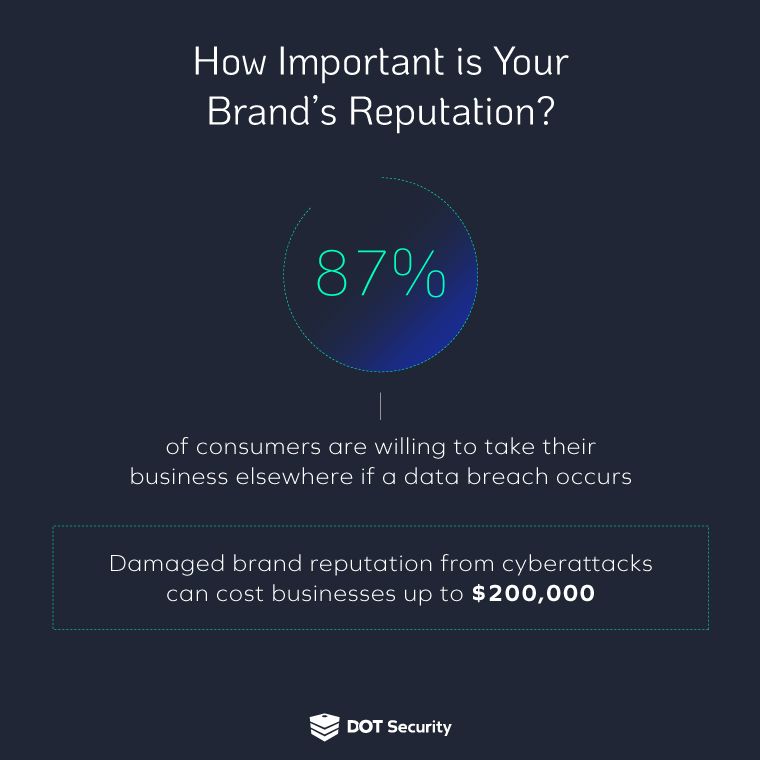Cybersecurity Consulting
Why Cybersecurity Should Be a Part of Your Brand Reputation Strategy
June 21, 2022
5 minutes

When building a brand reputation strategy, many businesses might overlook the massive impact that cybersecurity can have on it. Data breaches are not only costly financially but losing precious customer data can quickly erode public trust and damage your brand’s reputation.
Read on to learn more about why brand reputation is so important to businesses and cybersecurity’s role within a brand reputation management strategy.
Sign up for our newsletter!
Why is Managing Brand Reputation Important for Businesses?
The obvious impact of a poor brand reputation is financial losses that come from losing sponsors, sales, and customers. 70% of consumers say they’d avoid doing business with organizations that have experienced a data breach.
A poor public reputation can hurt businesses in a variety of ways, including:
-
Making it harder (and more expensive) to recruit top talent
-
Lower profits
-
Spending more money on marketing to improve public standing
These detriments can be expanded based on specific industries, also. For non-profits, it will make it harder to get donations; in education, it becomes harder to get donations, attract students, and receive grants; and in manufacturing, it can be more difficult to get lucrative contracts.

The bottom line is that businesses and people want to work with and be associated with upstanding companies, not companies that are frequently the victim of cyberattacks and that lose valuable company and customer data.
How Cybersecurity Can Help with Brand Reputation Strategies
When people think of brand reputation, most think of marketing, public relations, or social media, but it’s important to understand that cybersecurity plays a major role in maintaining a positive image for your company in the eyes of the public. There are few worse PR situations to deal with than a data breach where valuable customer data was stolen, especially if your business works in industries like education, healthcare, law, or finance where you’ll be handling especially sensitive customer data.
To avoid situations like this, it’s important to have a strong cybersecurity posture to mitigate the threats of a data breach and ensure stakeholders and customers that you’re doing everything you can to protect their data.
Here are a few ways that cybersecurity can help businesses manage their brand reputation strategy by mitigating the risks of a data breach:
Provide Proactive Security
The best kind of cyberattack is the one that never happens. With proactive network monitoring, threats can be identified before they can do damage to a business’ system.
Cybersecurity tools like employee education, next-gen antivirus, network monitoring, periodic system assessments, and penetration testing can help uncover vulnerabilities before they can be exposed and seek out threats before they can do major harm.
Put the Appropriate Security Measures in Place
Part of managing brand reputation with cybersecurity is showing your customers and other stakeholders that you’re doing as much as you can to prevent and recover from attacks. That means having the latest firewalls and anti-virus software protecting your network, maintaining compliance with any necessary standards, keeping your employees aware of modern cyberthreats and how to spot them, and protecting remote devices.
Related: 12 Basic Types of Network Security Measures
There are a lot of ways that bad actors can break into a network and steal data. Make sure you have all the tools you need to put together the strongest defense possible to mitigate the risks of a breach.
In Conclusion
Cybersecurity, when done effectively, plays a key role in managing a business’ brand reputation by protecting its customer’s sensitive information and building trust with the public. But one harmful data breach can destroy it all. That's why it’s so important to not only have the right defenses in place, but also the team in place to help train staff, identify threats, and respond appropriately.
Learn more about the layers that make up a strong cybersecurity defense with this infographic that explains each layer, what it is, and how it helps keep businesses more secure.
